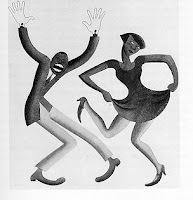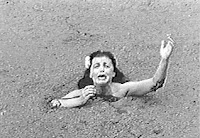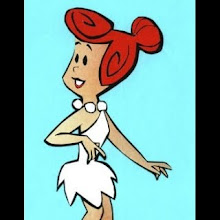Sunday, December 20, 2009
If I were creating an assignment for students, I think what I would do instead is make a movie, providing a preview of some of the poets reading their works, and some basic background on the movement. I would then assign a few poems from Ginsberg, Ferlinghetti, and Kerouac to start, shorter poems that we did not cover in 790. As I plan to teach freshman and sophmore-level classes, I don't think I would give them all of "Howl," maybe just the first few pages.
I really think that this movement in particular is so dynamic, that it lends itself to tremendous possibility for teaching. Some of the things I'm thinking of are having the students look into censorship and what happened with Ginsberg and "Howl." Or, they could write their own "beat" poetry, and give an in-class performance. I'm thinking of culminating assignment type thing. Or maybe I could convince some musician friends of mine to come in and play some jazz, while someone read "Howl." While I want students to get a feel for the freedom the artists were aiming for, I also want them to recognize how and why the beats have commanded such popularity and respect over the years. I also like the idea of such a diverse group of individuals coming together to form a movement.
Monday, November 30, 2009
Nearing the End
 The semester is winding down, and where the hell am I now?
The semester is winding down, and where the hell am I now?While I certainly am not in love with the computer, my hostility towards it has slightly waned. Some of our assignments have been pretty fun; glogging, movie making, and writing this blog stand out. I've even found the social interactive-ness of the work pleasant, to my tremendous surprize (nothing personal, I just don't usually like classroom group work).
Some of the stuff we've used I can see integrating into teaching, though some of it was a drag. The wiki page and delicious were bummers for me. The former allows anyone to edit our class page without even signing in, I feared erasing everyone's work, and had trouble getting my links into the proper place, which I'm sure would get easier with more practise. Delicious also gave me trouble, which I'm sure might work itself out with more practise, and I liked its archiving and collecting features.
Saturday, November 14, 2009
Quicksand Assignment

From earlier class discussions, we know that Nella Larsen's Quicksand was part of the larger literary outpouring of the Harlem Renaissance. Centered around the themes of African American and mixed race identity, agency, position, and voice, protagonist Helga Crane travels from place-to-place, trying on different facets of self, while searching for a sense of belonging, stability, and wholeness. Does she find what she seeks?
I have created a glog representing one aspect of Helga's quest, that includes some of my own questions on the text. Study the glog, considering my comments and some of the following:
While Helga's place as a mixed race/black woman in American society is de-stabilizing, and limiting, she seems to have more freedom of movement than some other characters in the text, but is this enough? How does this help or hinder her on her journey? Given the story's ending, how can we view the "opportunities" available to her?
How does Helga express herself? How does she not? Are her means of expression enough to facilitate agency? In other words, does she own who she is (or seems to be) and the decisions she makes?
Present in the text is a constant tension between self-definition and imposed identity, true self and constructed self. Does Helga find herself or create herself (think about this one a little)? What would be the difference, and does it matter? What about the identities that are imposed upon her, how and why does she find them fulfilling, and how and why do they fall short? What do these impositions suggest about the larger themes in the text?
As a reader, are you satisfied with Helga as a character? How do you feel about the story's ending?
Assignment:
After you have studied my glog and thought things through a bit, choose one of the following:
A. Create your own glog and tell Helga's story. You must explore and include at least one of the over-arching themes of the text (agency, identity, voice, and place for mixed race/black women). Be creative! Cast Helga in a modern frame, if you find it relevant, and show me how and why it is so.
B. Go to our class web site [I will have one that is not Blackboard or iLearn], and write the equivalent of a page or two answering some of the questions I've asked, or scholarly questions of your own. I want you to explore ideas comfortably, but also grammatically (free-writish, but be thoughtful of staying focused and trying to write as clearly and concisely as possible).
Sunday, November 1, 2009
Ya Call that a Movie?
Saturday, October 31, 2009
I'm Still Here!

O.K. I tore something in my right shoulder, so I've fallen behind a little.
Right now, I'm working on finishing my movie and getting it up on Youtube (however you spell it). Being on the computer aggravates my injury, and I can only take so much Vicadin without puking, so things are going much slower than I'd like. Though, I'm hoping to be caught-up by the time we re-convene for class on Tuesday!
Friday, October 16, 2009
Thoughts on Our Lecture Discussion (And Thank You, Firefox!)

Okay. I'm now using Firefox for my New Media assignments instead of Explorer. It is soooo much faster and more efficient! Thank god.
Just a reflection on yesterday's in-class discussion around lectures. I now think that it was actually three distinct things we were talking about, in kind of a mooshed together way: straight lectures, lectures with a question and answer period, and focused class discussions. Our readings, on the other hand, well, two of the three (the lecture tips and the Clark blog), focused on pure lecturing, sans q&a, with no mention of discussions.
I appreciate that we covered style, considering entertainment value and engagement, but I still question whether a lecture need be entertaining to hold an audience, as different subject matters require different approaches. I certainly wouldn't want to see Angela Davis juggling in the middle of a lecture on the American prison system.
I'm glad we covered this topic, as lecturing will obviously be one of the more complex aspects of teaching, and I really hadn't thought about it in this way before. Once I am in the profession (teaching, that is), I hope to conjure up a good laugh at times, but also remain earnest enough for students to take the subject matter seriously. Which makes me wonder, if a lecturer is focused on being entertaining, can she still treat the subject matter seriously? Will students believe that an entertaining instructor is serious? Is there a risk of losing control of the class and/or focus on the subject matter? Could the entertainment aspect serve as a distraction, and become more important/memorable than the lesson? I'm not down on entertaining lectures, I just had some thoughts.
End-note: I had no idea that State had English classes with over 100 students! How completely frightening--on a variety of levels!
Thursday, October 15, 2009
Whitman, History, and the Individual (Revised Whitman Assignment)

Walt Whitman's "Leaves of Grass" celebrates the individual as independent entity, and as a part of a collective oneness, composed of all selves. Bringing himself and the reader together as one, and then listing other members who lend themselves to the aggregate whole of American society, from the banker to the prostitute and the slave, he invokes a world in which all are created equal, defying a status-quo that regarded at least half the US population at that time as less than human, denying them the same personal liberties reserved for white males. The poem, a cultural object unto itself, employs a variety of tropes that both emphasize and celebrate the tensions present in the relationship between the individual and society.
THE UNIT
Introduction to Whitman:
I will introduce the poem and give some background on Whitman, with a little Emerson and Thoreau thrown in to show the climate of the literary world at that time, and the running theme of individualism. Then go over some of the connections between history and literature, and how cultural context can shape what is written and how.
Student Homework: Assign poem, have students begin collecting historical information on what was going on in this country around 1855 (maybe 20 years before, not more than 10 years after), when the poem was written. Each student must post at least one historical finding on a class web page before the next class meeting--no more than two postings on the same topic.
In Class: Start discussing poem, considering the following: What is the poem about, topically and thematically? Identify recurring motifs. What is the purpose/effect of repeating certain images? How do they fit into Whitman's vision, and the dominant culture of his time (and ours)? Discuss cultural objects.
Student Homework: Reread poem. Research more historical markers, and add them to our class page--each student needs a total of two postings, covering two separate events.
In Class: Continue discussion of the poem, and begin going over student's historical findings, making connections between themes and images in the poem and the events students have found in their research . Discuss slavery, and the fugitive slave in particular, my chosen "cultural object." How is the cultural climate reflected in "Song of Myself?" How does the individual factor into the poetic and cultual contexts?
Student Homework: Have students re-read poem, and review class website findings. Have them do peer-reviews of each others' on-line postings, covering the value they think the post offers in terms of studying Whitman's poem. Each student must comment on two postings.
In class: Put it all together. Have students break into small groups and discuss the the following quesions. Why does Whitman select certain motifs? Which motif's are cultural objects? Does Whitman's treatment of his subjects reflect the social/political climate of the period, or are his feelings his alone? What about his place as a white male living at that time, and his perspective on the individual? How does this challenge or reconcile the poem? Regroup, report, and discuss.
Student Homework: Read the poem again, do final assignment explained below.
First some leads into the cultural climate in which Whitman composed "Song of Myself:"
(This is included as a courtesy to my classmate who will have to complete this assignment.)
Free/Slave States: From as early as 1787, up through the Civil War, states were admitted into the Union as "Free" or "Slave." Those not allowing slavery designated as Free, and those that did, Slave.
Nat Turner: An enslaved man who escaped and led a bloody insurrection in 1831, resulting in the murder of many white slave owners and their families.
American Anti-Slavery Society: National abolitionist group formed in 1833 from a conglomeration of other organizations, working for a peace-able end to slavery in the United States.
Frederick Douglass: A man who escaped bondage and in 1845 published his autobiographical work, Narrative of the Life of Frederick Douglass, An American Slave.
Seneca Falls Women's Conference: Organized by Susan B. Anthony and Elizabeth Cady Stanton, among others, in reaction to women being barred participation in the International Anti-Slavery Convention held in London in 1840. The Women's Conference happened in 1848, and there Sojourner Truth, formerly a slave, delivered her famous "Ain't I a Woman" speech.
Fugitive Slave Act of 1850: Federal law passed to abate Southern animosity over Northern efforts to eradicate slavery, the institution that was the backbone of the Southern agricultural economy. Under this act, bounty hunters pursuing the alleged escapee could draft anyone to help them in recovering "fugitive slaves," thus forcing people who opposed slavery to participate in incarcerating and enslaving others. As this statute required no proof of "ownership," many free people of African heritage were captured and sold into slavery.
Underground Railroad: A series of "safe houses" situated along a route leading to freedom in the Northern states and Canada. Harriet Tubman, who had escaped slavery, is one of the greatest known conductors, credited with having rescued numerous people from bondage, including her own family. Though the dates of operation are hard to pin down, by the time Whitman was composing "Leaves of Grass," the Railroad was well known among abolitionists, and had been in operation for some years.
Assignment: Choose either A. or B., and consider this an "informal" writing assignment.
A. In "Song of Myself" Whitman refers to slaves and particularly the fugitive slave in several passages. Using the slave, fugitive slave, or another motif in the poem, write a page (or less, if you can do it thoroughly and concisely) explaining how this emblem of American society speaks to the underlying tensions in the relationship between the individual and collective whole, while at the same time rejoicing in it. Some questions to consider: Is such tension inevitable, valuable? What are some of the deeper issues that this tension might point to? Why would Whitman choose to include marginalized and degraded groups/peoples in a poem of celebration, particularly of the self? How does Whitman align himself which such groups? Is he sincere, convincing, successful?
B. Considering some of the questions above, and sticking to the main theme cited in A., write a page (or less, if you can do it thoroughly and concisely) choosing the image of the slave, fugitive slave, or another in the poem, and explore how it could never be reconciled into the American whole. Avoid attacking Whitman, instead present your own slant, based on the historical context in which the poem was written and maybe even mapping your argument to the present day.



